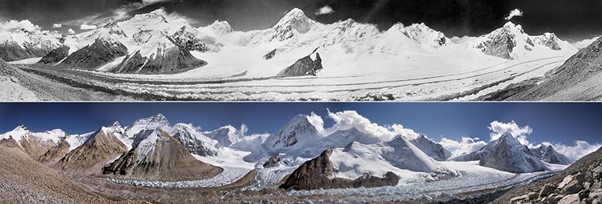
TIP OF THE ICEBERG: CONSEQUENCES EXTEND FAR BEYOND THE MOUNTAINS
The Swiss Academy of Sciences has documented a more rapid collapse of Alpine glaciers over the past two years, an acceleration equal to the entire volume lost from 1960 to 1990. That stat is based on a decline of 4% this past summer and 6% in 2022, the worst year ever. The cause of course is record high temps and record low snowfall.
Europe’s glaciers had already lost about half of their volume in the past century.
Swiss scientists have stopped measuring many glaciers, simply because they are essentially gone. Matthias Huss of the Glacier Monitoring Switzerland organization (GLAMOS) predicts that only about one third of the mountain nation’s glaciers will make the long haul even if the imaginary international 1.5C target.
This is more than just bad news for the Alpine tourist industry. Yes, glacier retreat does threaten local economies based on ski resorts, climbers and hikers (the death toll for hikers is climbing as glaciers collapsed). But water from melting glaciers is also essential to the fresh water supply of Europe and the ability of major waterways to provide transportation. Shipping on the essential Rhine River has been restricted in 2022 and 2023 because of low water levels.
Alpine glacial runoff also irrigates crops and cools nuclear plants. The emerging pattern is insidious: First there is more water, then there is no water. Glaciers produce more meltwater in the early stages of rapid melt, then it is gone.
Almost a side show (albeit potentially deadly), newly formed lakes are growing to bursting behind moraine dams, creating Glacier Lake Outburst Floods (GLOF), which endanger mountain villages downstream when the dam collapses.
Finally, as previously reported, as ice melts in the very rocks that form the mountain structure, the frozen “glue” that keeps it all together is thawing permanently (similar to crumpling permafrost in the Arctic). The imminent danger of entire mountains disintegrating into rock slides is driving evacuations of places such as Brienz, Switzerland, which was abandoned just prior to a mammoth rock avalanche that nearly destroyed the canton in June.
Glaciers